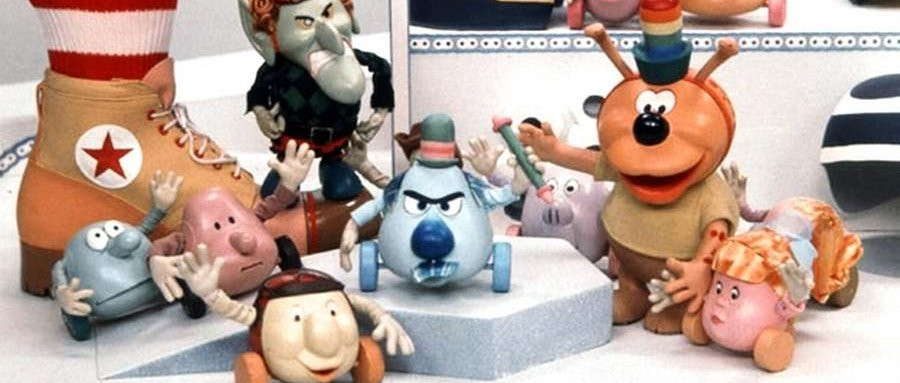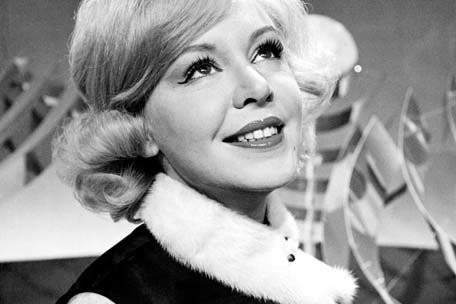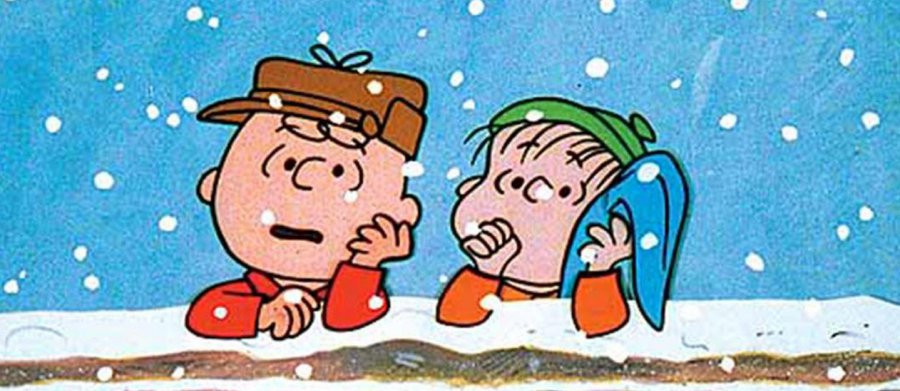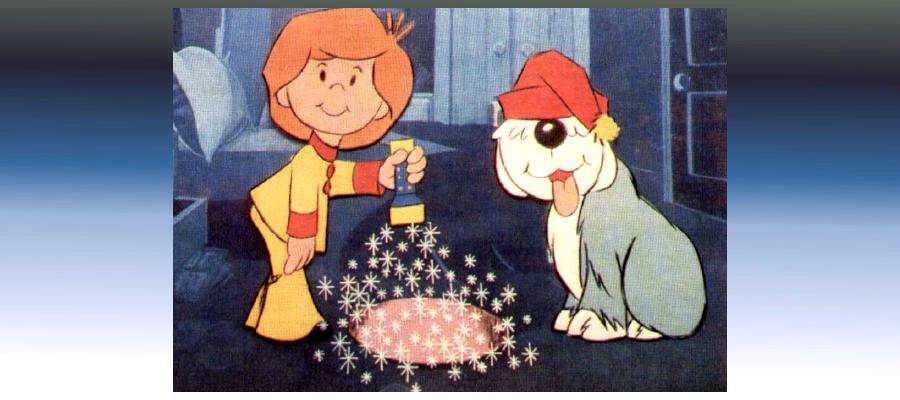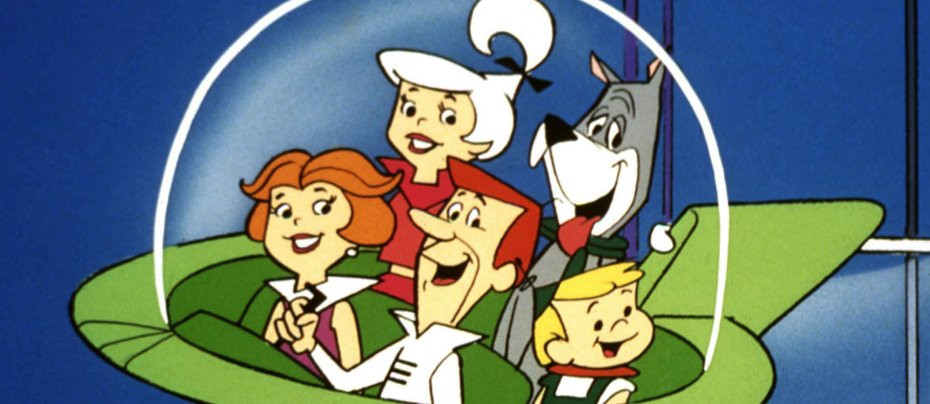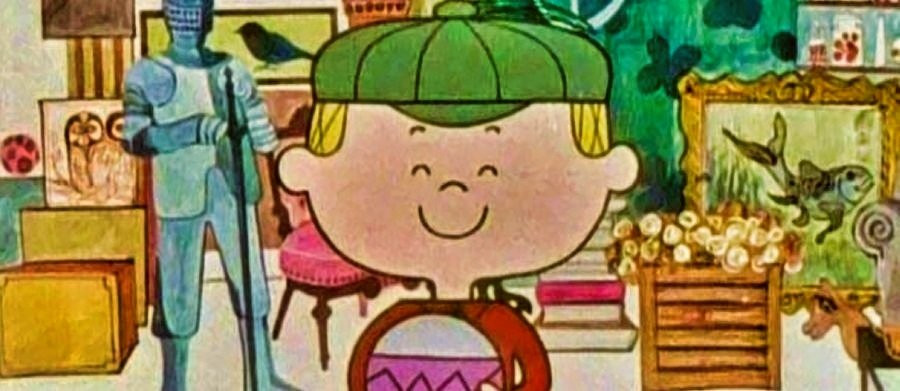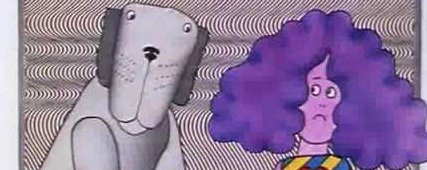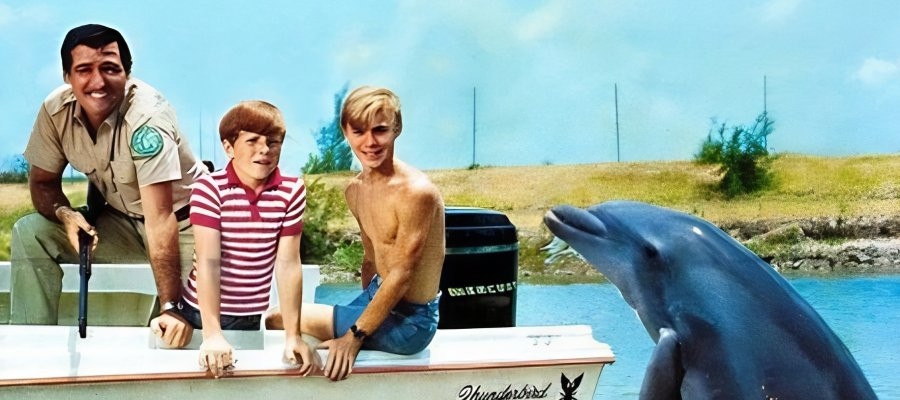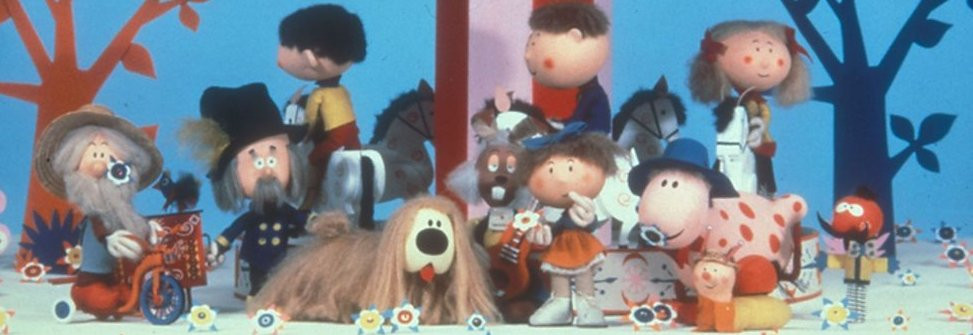
The Magic Roundabout
1964 - FranceMr Rusty's Magic Roundabout can be found in the heart of the Magic Garden and it is his barrel-organ which provides the show's theme music as the roundabout magically fades in and out of view at the beginning and end of each episode. But sadly for the whiskery old gent, this is just about where the magic begins and ends as his roundabout is now deserted. Then, one day a parcel arrives and it contains a jack-in-the-box figure called Zebedee who will eventually become the self-appointed guardian of the Magic Garden. It is with Zebedee's arrival that the magic begins.
With a 'boing' Zebedee bounces into the picture accompanied by the mystical sound of harp strings and all manner of lovable and, at times, strange characters appear. These include a young girl called Florence, a rather pompous sleek-haired dog called Dougal, an extremely laid-back beatnik rabbit named Dylan, Ermintrude the cow, Brian the snail, a cyclist called Mr MacHenry, a talking train and some occassional characters such as Florence's friend Paul. Although each episode was only five minutes in length the fact that it was broadcast daily (midweek), following the BBC's afternoon children's programmes and just before the early evening news, guaranteed the programme a viewing figure of over eight million and gave it a true 'cult' status that survives to this very day. However, the British public may never have heard of The Magic Roundabout because the year before they broadcast it the BBC had rejected the series out of hand.
The Magic Roundabout was created in 1963 by Frenchman, Serge Danot, and was originally called Le Manège Enchanté ('The Enchanted Merry-go-round'). Danot devised and wrote the programme before teaming up with Englishman, Ivor Wood, in 1964 in order to complete and produce the original French series. On selling the first 11 episodes to Ortf (Office of Broadcasting French Television), they found that they had a huge hit on their hands and quickly turned their attention to England. But on offering Le Manège Enchanté to the BBC it was rejected as being far too awkward and difficult to dub into English. But in 1965 the Beeb finally agreed to buy the series which was then passed on to Joy Whitby, the producer of 'Playschool', who in turn handed the series over to one of that show's presenters, Eric Thompson (father of actress Emma).
Emma Thompson later recalled; "When the BBC asked him (Eric) to write The Magic Roundabout they lent him a machine with a tiny screen which he used to work with his feet. He watched the pictures without sound and wrote the script with a pencil and pad balanced on his knees. The stories had originally been written in French, but he didn't much like the French, so he changed it all - even the names, like Ermintrude the cow, who was inspired by his wife."
It has been said the adults may have found a lot more to smile about in the series than merely sitting down to watch television with their little ones. The more 'tuned in' viewers may have discovered certain similarities to 1960s drug culture and references to topical issues and personalities of the day. Dougal was most certainly named after French leader Charles De Gaulle and his favourite food was sugar cubes which, it is pointed out, when laced with LSD is a popular way of taking the hallucinatory drug. Dougal and Ermintrude were said to be comments on French-Anglo relations at the time while the cynical dog's character was based on British comedian Tony Hancock, always known for his cynical hangdog expression. Dylan (based on the American folk singer, Bob Dylan) always appeared 'spaced out', and has been accused of growing something considerably stronger than carrots in his vegetable garden, while the Magic Roundabout itself is supposedly an allegory for 'taking a trip.' And then again, perhaps not. After all, this was 1965 and the pre-psychedelic era, and perhaps the series, like Lennon's 'Lucy In The Sky With Diamonds', just fitted conveniently into the context.
Whatever the truth behind the series The Magic Roundabout stayed on top of the tea-time viewing figures for two years and when the BBC tried to move it from its 5.55pm time-slot to an hour earlier there was a public outcry from its loyal fans and the Corporation had to reconsider. Even as late as the early seventies, the series, now being shown in colour retained its popularity and another attempt to move it from its regular slot resulted in angry letters to the Radio Times such as the one published on 25th March, 1971: "I should like to know how the BBC thinks I am going to regain my equilibrium after teaching all day if there is no Magic Roundabout to come home to?"
That was the year the show concluded its French broadcast but in the UK a surplus of episodes allowed it to continue through to 1977. Then, in 1992, Channel 4 in Britain discovered that 39 of the original episodes had never been broadcast by the BBC. Sadly, Eric Thompson had died in 1982, so for the new version actor Nigel Planer was brought in, with his brother Roger producing.
There have also been two 'Magic Roundabout' feature films. The first, in 1972, distributed by Nat Cohen for Anglo-EMI Film Distributors Ltd and produced by Goodtimes Enterprises run by Sandford Lieberson and David Puttnam and also written by Eric Thompson, featured a new character, Buxton, the Blue Cat, a North Country lad with delusions of grandeur who meets the regulars in the Beautiful Wood where he is given an enthusiastic welcome by everyone -except for Dougal. The story did nothing to dispel the 'drug culture' allusions and if anything was even more outside the edge than the series had been.
Then in 2005 a new version appeared in theatres, this time using state-of-the-art animation techniques in place of the stop-frame animation of the original. As another departure from the original series, there was no narration and each character was given his, her, or it's own voice and featured an all-star cast including Robbie Williams (Dougal), Bill Nighy (Dylan), Joanna Lumley (Ermintrude), Jim Broadbent (Brian), Kylie Minogue (Florence), Lee Evans (The Train), Sir Ian McKellan (Zebedee), and Ray Winstone (Soldier Sam). This was another classic story of good versus evil the malevolence coming from Zebedee's evil twin Zee-Bad, voiced with glorious over-the-topness by Tom Baker.
Serge Danot said of his show: "It comes from a simple history of everyday life, with characters having humour, poetry and an anecdote and aims to be as close to the parents as children, which makes it possible to join together various generations." And it seems there are countless more generations waiting to discover the magic of The Roundabout. "Time for Bed!"
Ivor Wood
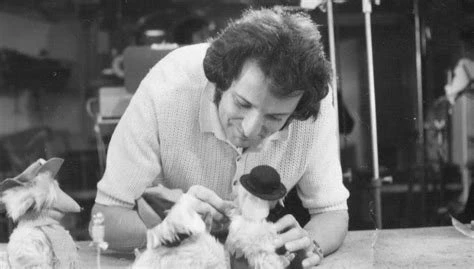
Ivor Wood was born on 4th May 1932 in Leeds. His British father and French mother moved to a village near Lyon after WWII, and Wood would continue to live in France until the late 1960s.
After studying at the École des Beaux Arts in Paris he developed his skill with the stop-frame animation process which remained his preferred technique throughout his career.
Serge Danot came to Wood with an idea for The Magic Roundabout in 1963 where they met in Paris cafés and bars after work. Danot, Wood and his French wife Josiane refined the concept and they finally produced the first series of Le Manège Enchanté in black and white in 1964.
When Danot moved operations out to the French countryside, Wood decided to stay in Paris and pursue new projects and partnered with the British production company FilmFair to make The Herbs.
The Adventures of Parsley, created by Michael Bond, followed. Wood then designed characters for FilmFair's Hatty Town.
Wood's next big success was The Wombles.
Wood decided to go it alone from FilmFair to set up Woodland Animations and invested heavily in Postman Pat. It proved a wise invetment when Brand House Entertainment Rights acquired Woodland for £5.1 million in November 2001.
Ivor Wood passed away on 13 October 2004 and his friends took out a full page in Broadcast magazine which read: "You will be missed. Your legacy will remain in children's hearts for all time."
Seen this show? How do you rate it?
Seen this show? How do you rate it?
Published on January 17th, 2019. Written by Laurence Marcus for Television Heaven.


